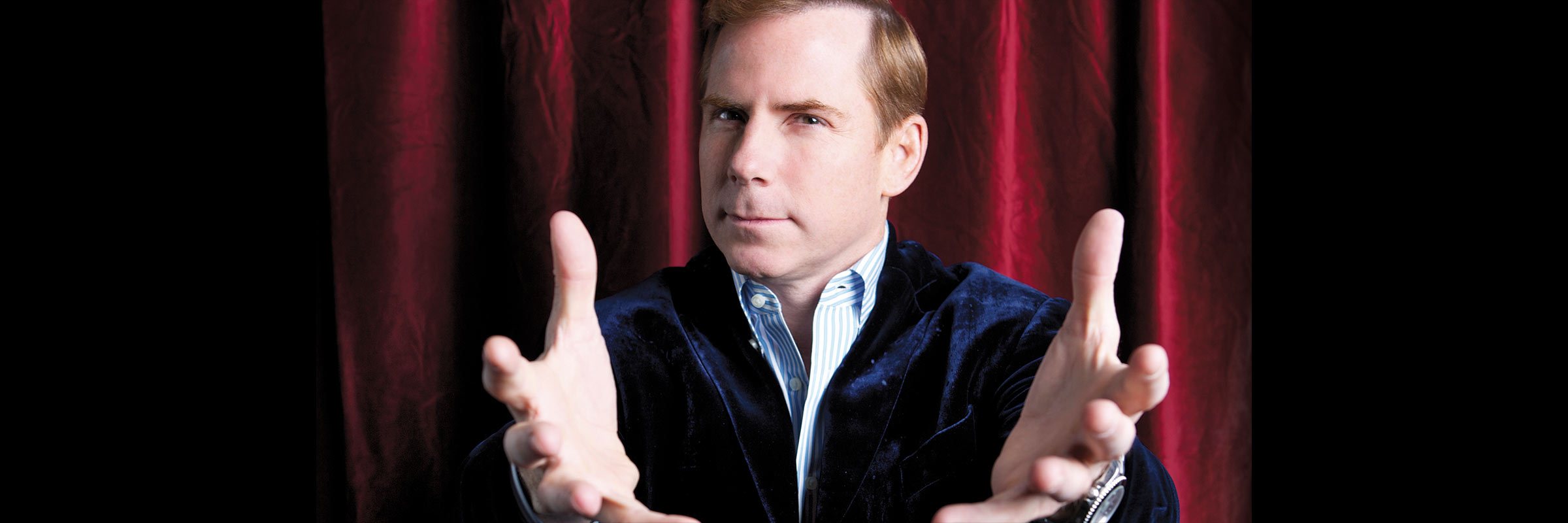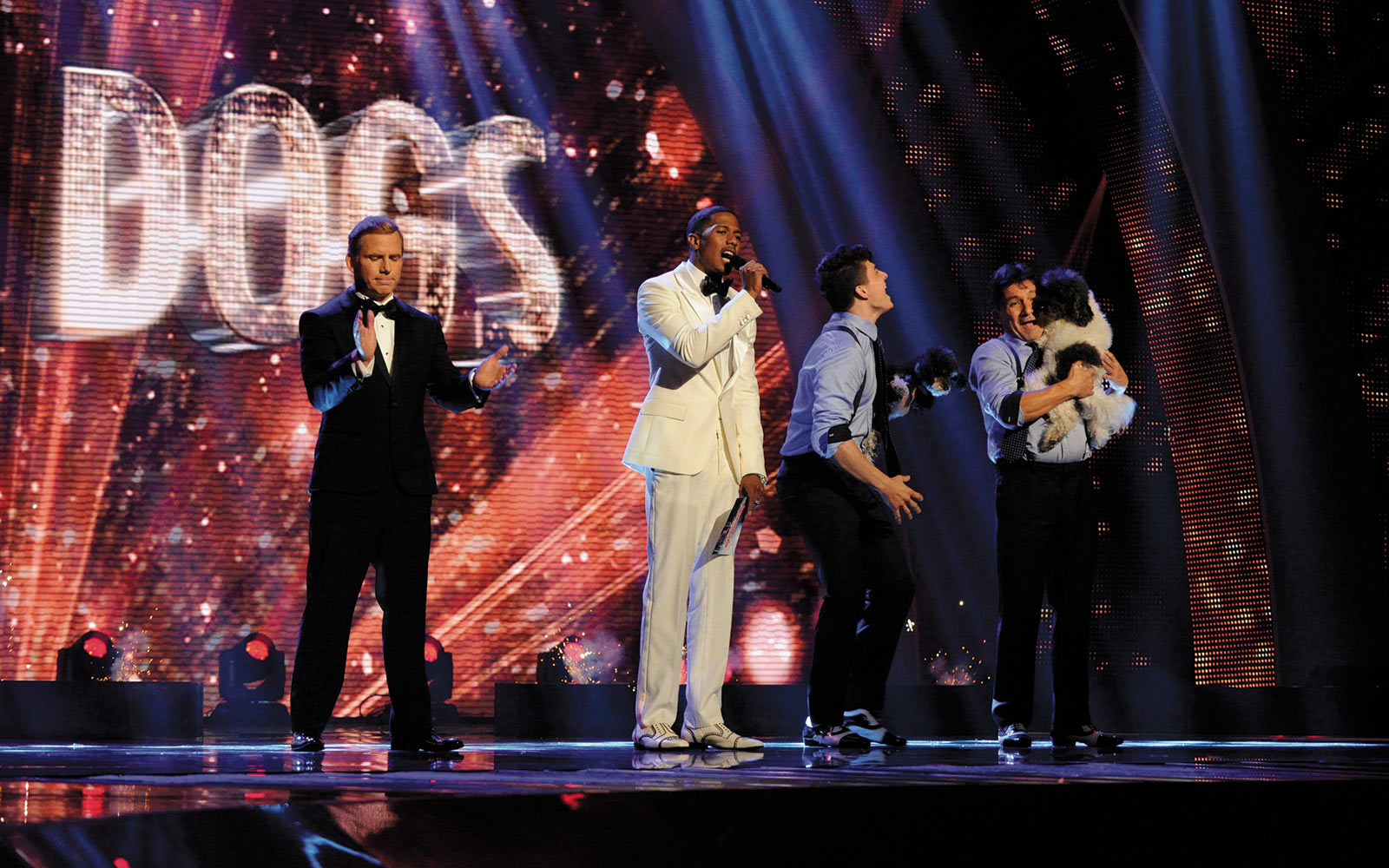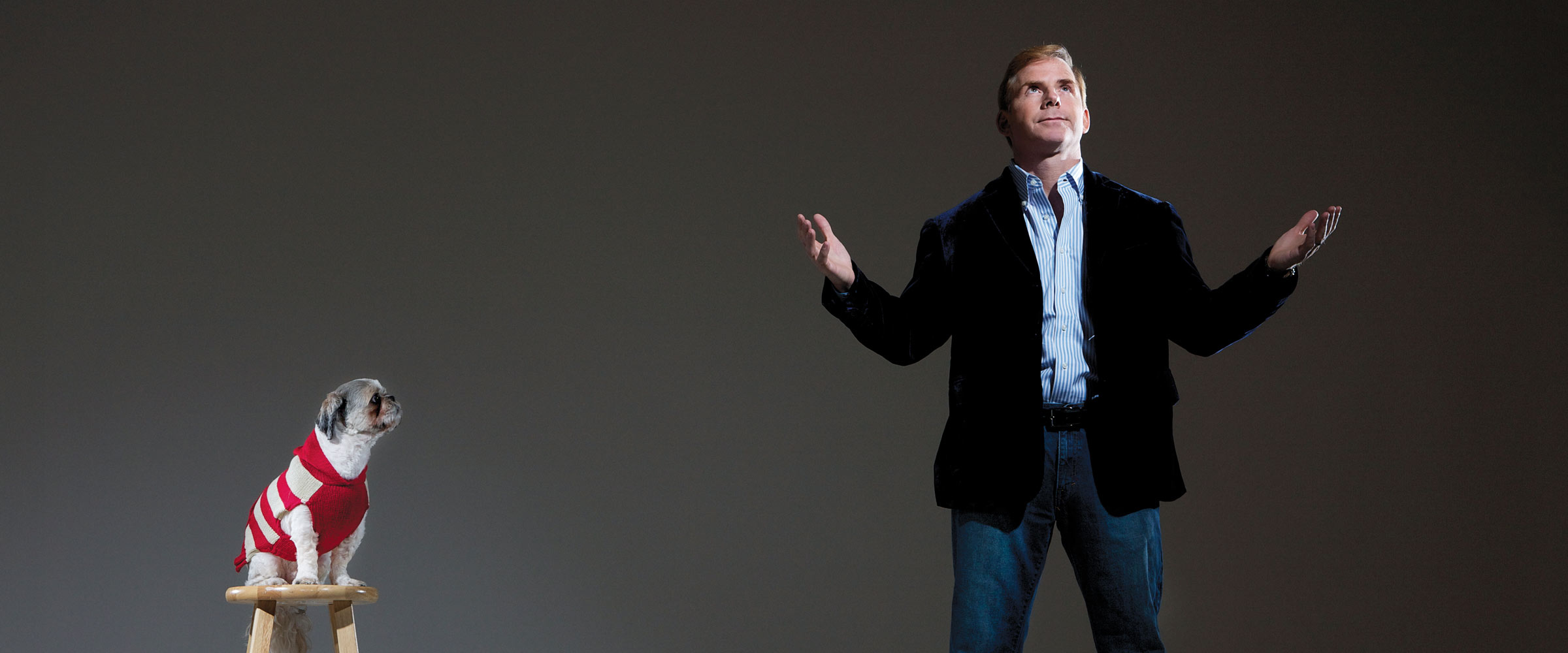That’s what comedian Tom Cotter trusted with his future—and a million dollars—as a contestant on America’s Got Talent, NBC’s hit reality competition carnival. No stand-up had made it past the top ten in the show’s six-year history, yet there was Cotter, on stage at Newark’s Prudential Hall in September, in the finals, much to his surprise. His five remaining competitors were formidable: a troupe of adorable dancing children, a troupe of adorable acrobatic dogs, a posse of rock ’n’ roll speed painters, a sand artist, and a guy dressed like Robin Hood who plays the world’s largest stringed instrument (which, by the way, he built himself). Then there was the 49-year-old with the microphone who rattles off old school one-liners, a Rodney Dangerfield in the age of Dane Cook. With an appearance on The Tonight Show and his own Comedy Central special, Cotter had already tasted more success than most stand-ups ever will. But those potentially star-making moments were a decade ago. Today, with three young boys and a wife who also earns a living telling jokes, winning AGT in front of an audience of 11 million viewers would be a life-changer.
After surviving four rounds without the aid of any bells or whistles, Cotter figured he’d need to go big to stand a chance against back-flipping dogs and the earth harp dude. He made a huge red die labeled with a different topic on each side and let the show’s host, Nick Cannon, give it a toss. It landed on “poor examples”—the one Cotter liked least, though by the reaction from the celebrity judges and the crowd, you’d never know it. His riff on what’s wrong with bedtime stories was a hit: “Sleeping Beauty—the girl passes out and a guy starts kissing her. That’s illegal, ladies and gentlemen.” Of Snow White and her dwarfs: “Every day they go off to work and call her a prostitute. ‘Hi ho, hi ho.’ That’s not right.” Fellow comic Howie Mandel and Sharon Osbourne raved, and the toughest judge, Howard Stern, went even further. “You are amazing,” he said. “You’re a terrific comedian, and in my book, a comedian deserves to win America’s Got Talent, and it should be you.”
The next night, after viewers phoned in their votes, Cotter found himself, to his utter disbelief, in the top two. But worse than his die roll were his fellow finalists—the Olate Dogs. As Cotter knows well, some folks don’t dig comedians. But who doesn’t love puppies in tuxedos walking upright like people? As Cannon paused before announcing the winner, the camera zoomed in on Cotter’s face. One could only imagine what he was thinking about. The simultaneous college tuitions for his 10-year-old twins in the not-so-distant future. His career in a rut. How this moment could announce to a national audience that Cotter, finally, officially, had arrived.
A few weeks later, I ask Cotter what went through his head during those eternal seconds before he learned he’d lost to a bunch of animals. He answers without missing a beat: “Did I trim my nose hairs?”
Less than a week after his defeat in front of a national television audience, Cotter takes the stage at the Comic Strip in Manhattan’s Upper East Side, and there’s no need to cue the sad trombone. Though it’s a Tuesday night, the room is nearly packed. It’s a homecoming of sorts, since Cotter and his wife, Kerri Louise, once lived around the block. Their headshots hang next to each other on the wall, near guys named Seinfeld, Murphy, and Rock. Cotter receives a rowdy welcome and wastes no time getting to the funny stuff. “I’ve been married for five wonderful years—10 total,” he says as the laughs swell. “Marriage is about commitment. Because at least once a month, I want to commit suicide.” Dressed in jeans, a white T-shirt and a black velvet sport coat, Cotter looks like a cross between Steve Carell ’84 and Richie Cunningham, but more athletic, with his broad shoulders hinting at his past as a high school wrestler and football player. He’s relaxed and in complete command of his material, which was a perfect fit for AGT’s 90-second performances—no storytelling, no dramatic pauses, just a relentless volley of punch lines. It’s less a comedic philosophy than a survival mechanism. “It was born out of insecurity,” Cotter says. “I was into the next joke before you got the last one. I have terrible stage fright.”
That’s hard to believe from a guy who’s spent more than a quarter-century on stages making strangers laugh. But over sausage gnocchi across the street from the club before his set, Cotter says he could never mimic Bill Cosby or Louis C.K. “There are great comics with huge pregnant pauses in the middle of their act, and they’re completely comfortable with it. They walk to the stool, they get a drink of water. The whole time I’m thinking, say something! People always say to me, you do two hours of material in an hour. It’s all bang bang bang.”
As the youngest of six growing up in Providence, R.I., Cotter was the typical attention-starved class clown. (“It’s ironic that I now get compensated for the same things that got me sent to the principal’s office.”) His path toward a comedy career began at Denison—“the best four years of my life,” he says—when he tried stand-up for the first time at a campus talent show his junior year. “I was very irreverent,” Cotter recalls. “The students liked it because I made fun of the campus and the faculty.” In the days that followed, classmates he’d never met were high-fiving him. Cotter was hooked.
Plans to go to law school were back-burnered in favor of open-mic nights at hometown clubs, where, by Cotter’s estimation, he bombed on a nightly basis. That sounds like torture to most rational people, but for stand-ups, those failures and the occasional big laughs are training, like an elite athlete lifting weights and sprinting, only with hecklers and a two-drink minimum. With some comedic muscle built up, Cotter moved to Boston in 1989 and immersed himself in a thriving scene that had produced the likes of Jay Leno, Denis Leary, and Steven Wright. “That’s where I really got to be a decent comic,” Cotter says.
After seven years of honing his act, Cotter moved to New York, the ultimate stand-up proving ground. He quickly learned that his success in New England and at competitions as far away as Seattle meant little in the cutthroat Manhattan club circuit—including the Comic Strip, where the owner turned down Cotter’s request to audition by saying, “I have enough short Boston comics.” Years earlier, Cotter had sent cassette tapes of his material to three of his idols: Dangerfield and Johnny Carson never wrote back, but George Carlin called to say he liked Cotter’s material, and offered to lend a hand if he ever needed help. Cotter decided it was time to cash that chip. He left Carlin a message about his struggles at the Comic Strip and hours later, his phone rang. “I was speechless,” Cotter remembers. “He said, ‘You’re on tonight at 11. Don’t drop the ball.’”

Cotter took his advice, and from there, his career arched skyward, from high-profile festivals in Aspen, Montreal, and Las Vegas to an appearance on The Tonight Show with Leno and a one-hour Comedy Central special. Cotter hoped he was on the verge of a breakthrough; instead, he plateaued. “It’s all C’s: colleges, corporations, cruise ships, casinos, clubs,” he says. “I’d done all of those already in Boston. I felt like I was spinning my wheels for a number of years.” Cotter wasn’t exactly collecting food stamps—some of his gigs, like a Chrysler commercial that aired during the Super Bowl paid residuals for years. But Cotter felt the weight on his shoulders was growing heavier. He had three young sons and a wife who put her own stand-up plans on hold for the sake of their family. He saw his Denison buddies achieve success in “normal” jobs that provided financial security he’d never known. And he still felt pressure to justify his career to his father, a successful neurosurgeon and Cotter’s role model. “I wasn’t getting any younger,” he says. “I’d been at this for 25 years, which is longer than most people would consider reasonable. I thought maybe it’s time for me to be a better dad and stay at home and sell insurance or do the 9-to-5 thing.”
Cotter didn’t think much of a phone call from a Friar’s Club friend about AGT auditions in New York back in April. He knew that comics usually fall flat on competition shows, and that one bad joke could lead to humiliation in front of an audience of millions. Like the dice roll he’d later use, Cotter figured it was time to gamble. Impressing stoic producers at the casting call was challenging, but backstage before his first round in front of the celebrities, fear began to creep in. “The judges can throw you under the bus,” Cotter says. “There’s Howard Stern, and I’m thinking this could be the worst decision I’ve made in my life. He has really great comics on his show all the time. How am I going to stack up to that?”
As it turned out, Cotter stacked up quite well. Stern loved his act, as did Osbourne and Mandel, who gave him a standing ovation. Cotter breezed through round after round without hearing a single critical word from the judges, and the show framed him as a likable everyman, trying to win a million dollars to support his wife and kids in a way he’d never quite done before. That wasn’t editing room sleight of hand—it was the authentic story line of Cotter’s life, and the emotion that came through in interviews with him and his wife was genuine. In one segment, Cotter choked up at the thought of his father seeing him in the finals; in another, his wife talked about living for the next paycheck. Weeks after the show wrapped, Kerri is still overcome by the AGT experience. “I knew the magnitude of this, and how important it is,” she says while juggling a phone conversation and the demands of her three boys. “Every night I prayed, please, let him have this moment. He deserves it. He works so hard and leaves his family when he doesn’t want to go, then comes home and writes for an hour before he goes to bed. It’s amazing seeing his dream coming true.”
Of course, Cotter’s dream didn’t end with him placing second behind a pack of dogs. Yet unlike the awards-show losers who struggle to say it was an honor just to be nominated, Cotter seems genuinely thrilled with his runner-up finish. It helps that he’s getting more job offers than he can handle, with bookings running all the way to 2015; one corporation changed the date of its employee retreat to fit his schedule, and a pharmaceutical company is paying him as much as he made in an entire year not so long ago for one appearance. “This has breathed so much life into my career,” he says. “I had done The Tonight Show, but I wasn’t climbing. The peaks weren’t that high, and the valleys were depressingly low. This is a mountain. All the people I’ve touched with this… I can’t even get my head around it at times.”

At the Comic Strip’s lobby bar, Cotter hears congrats from fellow comedians and fans. Like the pro he is, Cotter has a few lines ready. “You have impeccable taste in comedy,” he tells a couple of people who praise his AGT performances. A blonde woman says that a few years back, she got engaged on a cruise he performed on, and so was rooting for him on AGT. “Look me in the eye,” he says, “so I know you didn’t vote for the dogs.” Cotter poses for cell phone photos and promises another stand-up a steak dinner for a joke he contributed for the show, even though Cotter didn’t use it. More evidence that Cotter is the same endearing guy in real life and reality TV—he’s most moved when talking about AGT’s effect on his family. His 89-year-old father, who drove six hours to the finals in New Jersey, can’t hear well enough to understand Cotter’s jokes, but the standing ovations for his son made Cotter feel like he’d finally justified his career choice to his dad. His own sons also saw him differently. “I want my kids to hold me in the same regard I held my dad,” Cotter says. “[My job] was nothing they’d ever brag to their friends about. But this summer, it was cool—they bragged to their friends and they got some TV time themselves. It was something we could do as a family.”
In two days, Cotter will fly to Las Vegas for a month-long run in the AGT live show—a gig that’s not ideal, since he’ll be away from his kids for longer than ever before, and he’s had to put job offers that were far more lucrative on hold. Cotter’s smart enough to strike while the iron is hot, though, and he lets me in on a little secret. Tonight’s set was actually an audition for The Late Show with David Letterman, and at the bar, the show’s talent scout tells Cotter he’d like to have him on as a guest when he’s back from Sin City.
As much as Cotter is looking forward to stepping out from AGT’s sizable shadow, he’s relentlessly gracious—to the judges, the other acts, and his fans. For the first time in years, he’s not worried about what the future will hold. “I love making a room full of strangers laugh,” he says. “I wished all along it was more financially rewarding. Now, it’s gonna be.” Cotter’s new dream is sticking with television, perhaps as host of a talk show. Many stand-ups use Hollywood to escape the comedy clubs; Cotter
sees it as a promotional tool, the best way to get more people out to his shows. And what if there’s another plateau? What if there are no more mountains to climb? “I will never stop doing this,” he says, and for one rare moment, there’s no punch line that follows.
Richard Rys is a writer-at-large for Philadelphia Magazine.

